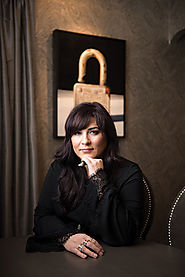-
About
- About Listly
- Community & Support
- Howto
- Chrome Extension
- Bookmarklet
- WordPress Plugin
- Listly Premium
- Privacy
- Terms
- DMCA Copyright
- © 2010-2025 Boomy Labs
 Catherine Morgan
Catherine Morgan
Listly by Catherine Morgan
Curated resources for living with - and working through - depression and anxiety. Catherine Morgan is also the founder of The Depression Discussions™ www.DepressionDiscussions.com

For those suffering from depression, each day can feel like a new battle - and there is rarely only one symptom. In reality, depression affects everyone differently and can manifest in symptoms or feelings that are not always discussed. On Twitter, M Molly Backes, author of The Princess of Iowa, highlighted an important but often-overlooked symptom of depression, which she referred to as the “impossible task” - and it’s resonating with thousands of people.

As rates of depression in entrepreneurs rise, the rest of us need to keep talking about it. That’s where The Depression Discussions comes in—and hopes to make a big difference.

Jessica Gimeno lives with bipolar disorder and wants to expand the discourse around mental health. It's not enough to just receive a diagnosis, she says, people have to learn to live with depression and other mental health issues. In her talk, she shares the techniques she's learned to help her get stuff done while depressed.

Entrepreneurship takes an emotional toll on founders and the people close to them. Depression, fear, and anxiety can quickly take hold and become unmanageable. Here are three things entrepreneurs must remember when confronting these challenges.

Catherine Morgan interviews Rich Gallagher, LMFT for the first episode of The Depression Discussions™: The Conversations We Need to Keep Having. Rich is a licensed psychotherapist, while Catherine just plays one with her career transition and solo consultant clients. Rich shares what he has seen work for clients with depression and anxiety in his more than 10 years in practice.

A FACEBOOK post discussing the realities of living with depression has gone viral.
The deaths of high profile personalities Kate Spade and Anthony Bourdain — who reportedly both battled depression — has brought the issue of mental illness into the spotlight.
As such, Charlene Nguyen thought it was timely to post this piece from an anonymous author on her Facebook page.
It has since been shared over 2700 times and has had over 1100 reactions.

In his “The Myth of Sisyphus” essay, French philosopher Albert Camus calls suicide “the only serious philosophical problem.” Philosophy’s search for meaning in life comes to a sharp halt when life is deemed unlivable. And like many gravely serious problems, suicide is one we’d rather not talk about.

Some of the everyday triggers for depression and anxiety could be hiding in your bathroom cabinet, kitchen cupboards, and what you eat for breakfast. Certified psychiatrist, MIT cognitive neuroscientist and researcher Kelly Brogan discusses why treating depression may be simpler than you think, and how to reclaim your health, starting today.

It was a beautiful summer day; the sun was shining, the birds were chirping, and here I was, sitting on the back porch, having returned home early from the office. I didn’t have sunshine and rainbows on my mind, far from it — I was devastated about how far I’d fallen. I thought I was a complete failure, worse than worthless, an embarrassment to my family and friends. Surely, when my secret was revealed, everyone would laugh behind my back. My business was running out of money and I had no clue how to save it.

Anthony Bourdain hosted 'No Reservations' and 'Parts Unknown,' but that's an inadequate way to describe what the chef managed to achieve.

Like most of you, I read the news about these suicides this past week with sadness. I was a fan of both Kate Spade and Anthony Bourdain. It felt especially scary for those of us that have suffered from depression, anxiety and suicidal thoughts.

Suicide rates increased by 25% across the United States over nearly two decades ending in 2016, according to research published Thursday by the CDC. Twenty-five states experienced a rise in suicides by more than 30%, the government report finds.

I’m about to go speak to NAMI Ohio’s statewide conference, Fulfilling the Promise. These are the remarks I prepared for my speech.

Where the results are most unambiguous is in the higher incidence of mood disorder in creative people. By Alex Fradera

In this extract from his new book, Johann Hari, who took antidepressants for 14 years, calls for a new approach

It’s more than Instagram envy. And thanks to our ever-increasing digital dependence, it’s likely to get worse.

New research suggests a radically simple way to approach your mind. Everybody ruminates: It’s that familiar pattern of chewing over your thoughts and your feelings about them. For people with depression, it takes a turn toward the pathological: The spiral that comes from feeling bad about feeling bad (about feeling bad!) can be immobilizing. But a new therapeutic approach — called metacognitive therapy (MCT) — targets that process with Zen-like deftness, and it’s been shown to dramatically reduce clinical depression. It’s also useful to anyone who’s felt run over by an uncontrollable train of negative thoughts.

Depression could be treated using anti-inflammatory drugs, scientists now believe, after determining that it is a physical illness caused by a faulty immune system.

Depression is a very serious mental illness that often goes unnoticed for years. People with concealed depression are battling demons within themselves all on their own. They are not sharing their struggles and do not want to burden those around them.

Jonathan talks about the tragic death of Chris Cornell, his music and the conversation that needs to be had about depression, suicide and stigma.

Most mornings as I leave the Y after my swim and shower, I cross paths with a coterie of toddlers entering with their caregivers for a kid-oriented activity. I can’t resist saying hello, requesting a high-five, and wishing them a fun time. I leave the Y grinning from ear to ear, uplifted not just by my own workout but even more so by my interaction with these darling representatives of the next generation.
What a great way to start the day!
When I told a fellow swimmer about this experience and mentioned that I was writing a column on the health benefits of positive emotions, she asked, “What do you do about people who are always negative?” She was referring to her parents, whose chronic negativity seems to drag everyone down and make family visits extremely unpleasant.

Entrepreneurs are often more susceptible to depression, so it's important to practice good mental techniques.

Depression isn’t the saddest person in the room. Quite contrary actually, depression sometimes is the person you would have never expected. Along with trying to convince you they’re happy, they’re trying to convince themselves.
Depression isn’t that melancholy person, you don’t want to be around. Oftentimes, it’s the person everyone loves because of the light they bring to a room is so bright but that’s only because they know darkness.
I guess you could say from the outside looking in, I had it all. The career, the house, a loving husband, beautiful healthy kids, the M Sport BMW, the spa membership, and the audience (including you) to get affirmation of my "perfect" and envious lifestyle on a daily basis.
The problem was that it was all a facade. I was actually in a deep, dark depression that was progressively getting worse and didn't know it until I was committed to a mental hospital on December 14, 2016.
